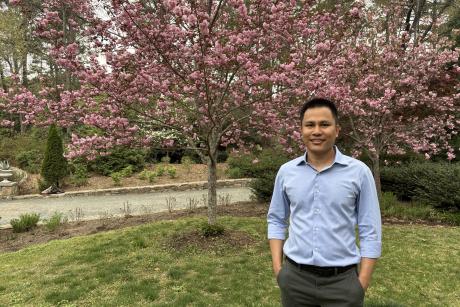
(From left) Veronica Sotelo Munoz, Jackie Xu, Sahil Sandhu and Janet Bettger smile in front of the group’s award-winning poster at the Global Health Research Showcase on November 5. Photo by Amey Chaware.
Published December 9, 2018, last updated on December 10, 2018 under Voices of DGHI
By Sahil Sandhu, Lillian Blanchard, Jacqueline Xu and Veronica Sotelo Munoz
Social and environmental factors like food insecurity and unstable housing account for 70 percent of health outcomes. Most health systems, however, are not fully integrated with community and social services to manage patients’ social needs. Student volunteers, eager for meaningful clinical experiences, are an untapped resource that health systems can better leverage to improve integrated patient care. To bridge the health system and available community resources, our Bass Connections team is launching a student initiative called “Help Desk.”
In the spring of 2018, we met with a variety of stakeholders in the Durham community and the health system to better understand local efforts addressing social determinants of health and to explore opportunities to collaborate. We’re excited to confirm Lincoln Community Health Center as our partner for the Help Desk initiative. As a federally qualified health center, Lincoln cares for a particularly vulnerable population. Many of their patients are uninsured, low income and medically underserved.
The Lincoln behavioral health team currently screens patients for unmet social needs and refers them to community services. To complement this existing work, we plan to have student volunteers follow-up with patients after these referrals.
Patients can face many hurdles when looking for community-based resources, like identifying a service location accessible by public transport or understanding service eligibility criteria. Volunteers can help patients navigate these barriers and thereby increase use of community resources. Furthermore, feedback from patients will help the behavioral health team to evaluate the capacity, appropriateness and effectiveness of the various community-based organizations to which they refer their patients. Data from the Help Desk will also enable Lincoln to identify current gaps and the need for additional resources.
We have been meeting with the Lincoln behavioral health team and research program lead from the Center for Personalized Health Care to map current clinical workflows and determine how student volunteers can help to “close the referral loop.” We’re also looking to align our work with the broader social determinants efforts in the state, notably the creation of a community resource database and referral network called NCCARE360. We hope Lincoln staff and our volunteers will be some of the leaders in this state-led initiative.

Help Desk model
This summer, we conducted site visits to observe three similar models in the San Francisco Bay Area. We met with program coordinators and shadowed student volunteers to identify best practices for service delivery and volunteer training.
We’re strengthening our program planning, evaluation and implementation science skills this fall in our Global Alliance on Disability and Health Innovation research seminar. These skills are the foundation for scaling and sustaining innovation as social intrapreneurs—people who work within their organization or community to promote practical solutions to system challenges. We created a logic model for the Help Desk and used an implementation science framework to create a detailed action and evaluation plan.
Our next steps include building a secure Research Electronic Data Capture (REDCap) web platform that volunteers can use to access screening and referral data and then document the outcomes of their patient calls. Our volunteers will adopt a motivational interviewing approach to enhance their effectiveness in communicating with patients and to help them achieve their own health goals. We will then recruit and train a base of student volunteers to launch the Help Desk program in the Spring semester. We look forward to creating a sustainable model for student engagement at Lincoln Community Health Center.
The Help Desk initiative is part of a three-year grant awarded to Lincoln Community Health Center by the Blue Cross and Blue Shield of North Carolina Foundation.
Learn More
- Check out the Help Desk team’s research poster, which won the award for best Bass Connections poster at the Global Health Research Showcase on November 5.
- Explore the 2017-18 GANDHI project team, and learn what the team is doing this year.
This post was originally published on the Bass Connections website.


